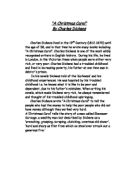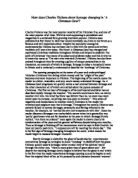Most children grew up facing a life following in their parent’s footsteps which meant a life of no education or money. The only option left was to be part of the ‘ Ragged Schools’, schools run through a charity which gave children a basic education and some religious lessons. Dickens himself was very interested in this charity although he did not agree with the compulsory religious education.
The lives of the poor were indeed very terrible and Dickens was determined to do something about it, he realised that people would take much more notice of the horrific living conditions for the poor if he wrote about them in a story. So through his characters in Christmas Carol he really reflected the truth about life for the poor, how even when their lives were the most terrible you could imagine, they spread love to others around them and they stuck together through the worst. How they weren’t lazy just not well enough paid. This really changed many of the rich peoples( or Scrooges) ideas about the poor and ended up changing many of the lives of the people living in London.
Dickens then went on to write a number of books that are still just as famous and widely read today. He was still writing in 1870 when he died suddenly leaving his final novel ‘The Mystery of Edwin Drood’ incomplete.
Dickens tells the story ‘A Christmas Carol’ almost like a song; each chapter is called a stave which means a verse. There are five staves; each one represents a different thing that happens to the main character Scrooge.
The first stave starts off with the Scrooge before the visits from the four ghosts;
‘He was a tight fisted hand at the grind stone, Scrooge! A squeezing, wrenching, grasping, scraping, clutching, covetous, old sinner’.
It is then a little later on in the first stave that the first ghost is introduced, Scrooge is visited by his long dead best friend the ghost of Jacob Marley. Marley tells Scrooge the coming plot of the story how he will be introduced to 3 different ghosts all with the same message ‘Change your ways’.
The second stave is the visit of the first spirit, the ‘Ghost of Christmas Past’. Then the third and forth staves are separated into the visits of the second and third spirits, the ‘Ghost of Christmas Present’ and the ‘Ghost of Christmas Future’. They tell of Scrooges life and how if he doesn’t change he will come to a very bitter end.
The fifth and final stave is how Scrooge has reformed his character he is a completely different person and he helps to change the lives of everyone who knows him.
Dickens uses many skills and techniques to portray contrasting views on Christmas through his characters. This way he managed to open the eyes of so many people living in London, he convinced them that the poor were not lazy but good, hardworking, honest people who deserved a lot more than they got.
In his novel he displayed two main, contrasting views on Christmas. One came from Scrooge, the typical rich man who did not see any reason to be jolly at Christmas as it was a time when you paid bills but had no money.
‘ What’s Christmas time to you but a time for paying bills without money, a time for finding yourself a year older, and not an hour richer.’
The other contrasting view comes from the poorer people, whom Dickens always displays in a good light. There are two main characters in the novel that come from poorer backgrounds, one is Scrooges clerk, the hardworking, honest Bob Cratchitt, the other is Scrooges very own nephew. He is very set against Scrooges point of view on Christmas.
‘A good time: a kind, forgiving, charitable, pleasant time…’
This is a very effective and clever technique that Dickens has used because he is emphasizing the fact that Scrooge is the miserly old man that doesn’t really care about anyone but himself and making money; this puts the poor in the good light, they are displayed as warm, kind hearted loving people who care and look out for each other. This is exactly what Dickens has intended to do; it has instantly made the reader aware that the poor people are the good.
Another example of a contrasting view on Christmas is also in the conversation that Scrooge has with his nephew. It once again emphasises on the fact that Scrooge only cares about money; Scrooge says
‘ Merry Christmas! What right have you to be merry? What reason have you to be merry? You’re poor enough.’
The nephew then replies:
‘Come then… What right have you to be dismal? What reason have you to be morose? You’re rich enough.’
Scrooge is saying here that his nephew has no reason to be merry at Christmas time as he is too poor; with which the nephew retaliates that in that case Scrooge has no right to be unhappy at Christmas time as he is very rich. Once again Dickens has used this effective contrast in opinion to emphasise the difference in attitude between the rich and the poor.
Another example of the difference in attitude to Christmas is when a Carol singer sings outside Scrooges door.
‘….Stooped down at Scrooge’s keyhole to regale him with a Christmas carol: but at the first sound of-
‘ God bless you merry gentlemen! May nothing you dismay!’
Scrooge seized the ruler with such energy of action that the singer fled in terror.’
Dickens emphasises here that although the poor are getting in the spirit of Christmas and are happy and having fun; Scrooge is not happy and will not let anything ruin his business and money earnings, not even Christmas.
The first sign of Scrooge showing any sign of pleasure at the fact that it was Christmas time, comes in Stave 2 when the Ghost of Christmas Past reminds him of a Christmas time when he was a boy.
‘ Why was he filled with gladness when he heard them give each other Merry Christmas, as they parted at cross- roads and bye-ways, for their several homes! What was merry Christmas to Scrooge? Out upon merry Christmas! What good had it ever done him?’
This is useful because for the first time here you see that there was a time when Scrooge was a normal young boy who got as much pleasure out of the fact that it was Christmastime as anybody else. This attitude, as we know, must have changed as he got older, and started to earn his own money., so this is another subtle clue from Dickens that the poorer you are the happier you become.
Halfway through the first stave you really start to see a change in Scrooges attitude to Christmas.
‘There was a boy singing a Christmas Carol at my door last night. I should like to have given him something: that’s all.’
Scrooges attitude is starting to change as he remembers what it was like to be young and poor. The reader begins to see a softening side to Scrooge. Scrooge is just starting to see how he must change his ways.
Dickens also shows a good sense of humour throughout the story and a good technique he often uses is to take the mick out of his characters, especially Scrooge.
‘ When the Bell struck One and no shape appeared, he was taken with a violent fit of trembling. Five minutes, ten minutes, a quarter of an hour went by, yet nothing came.’
This is significant because it shows a lot about Scrooges personality, he doesn’t believe what is happening to be true but he is still very afraid of the next spirit; this is possibly because he knows it will only show him bad things about himself and his attitude to Christmas, however he feels very stupid at the fact he is actually scared; which is humorous for the reader.
Throughout the novel Dickens subtly adds in many techniques that help to put the poor people in a good light. He makes a lot of contrasts between the poor and rich but for the first time in the third stave, he contrasts the poor peoples’ awful homes with their high spirits.
‘ The sky was gloomy, and the shortest streets were chocked up with a dingy mist, half thawed, half frozen , who’s heavier particles descended in a shower of sooty atoms…There was nothing very cheerful in the climate or the town, and yet was there an air of cheerfulness abroad that the clearest summer air and brightest summer sun might have endeavoured to diffuse in vain.’
This is very important to the novel as it really reflects the poor peoples attitude to Christmas. It is very ironic because even though their living conditions are terrible and houses and streets were filthy with dirt, they are happy and high spirited, willing to help each other and making the most of the Snow and Christmas season. Dickens is once again reminding the reader of how good the poor people are.







